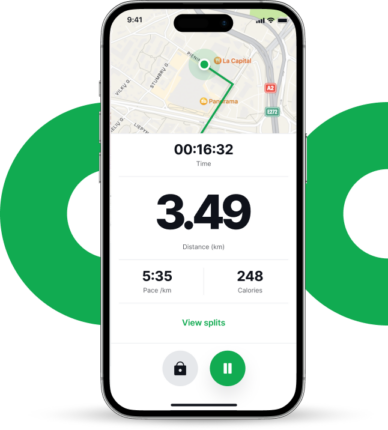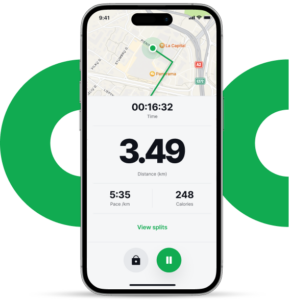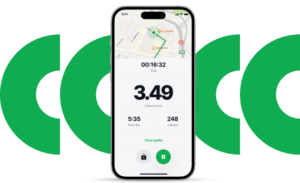How many miles is a 5K? Knowing the common race distances will help you pick the right race for you. It will also help you set realistic long-term running goals.
The 5K is the most popular race distance in the US, making up almost half of all paid registrants in 2017, according to race discovery service Race Raves. It’s appealing for both beginners and advanced runners.
Let’s look more closely at common race distances and how to train for 5K. But first…
In This Article
In This Article:
Kilometer to Mile Conversions and Vice Versa
In the US, the mile is used more commonly than the kilometer when it comes to race length. But there are exceptions, so it’s good to know the difference.
Kilometer to mile
1 kilometer is 0.6 miles. That’s 2.5 standard track laps. For reference, a standard track lap is 400 meters.
Mile to kilometer
1 mile equals 1.6 kilometers or 4 track laps. Most running apps today can do the conversion for you.
How many miles is a 5K?
A 5K is 3.1 miles or the equivalent of 5 kilometers or 5,000 meters. The longest-running event at the ancient Olympics, the dolichos, is thought to have been around this distance. A 5K adds up to 12.5 laps on an outdoor track.
How long does it take to train for a 5K?
It can take 4 weeks or less to get fit for a 5K, depending on your fitness level. The 5K is the easiest long-distance race to train for, which is why many beginner runners start with it.
How long does it take to run a 5K?
Most runners need 30–40 minutes to run a 5K. That means a pace of around 10 minutes per mile.
What should you eat before the race?
The best food to eat before a 5K race is high in energy but easy to digest. Think peanut butter, oatmeal, and dried fruits. It’s best to eat 2 hours before the race.
A 10K Race
A 10K is 6.2 miles or 10 kilometers (10,000 meters). It represents over 14% of all running events, according to Race Raves.
Most runners who feel comfortable with the 5K go for the 10K. This race is also a natural objective for runners preparing for a half-marathon or full marathon.
How long does it take to run a 10K?
At a pace of around 10 minutes per mile, you can expect to finish this race in a little over one hour.
How long does it take to train for a 10K?
It can take up to 12 weeks to get fit for a 10K if you haven’t been running recently. Transitioning from a 5K to a 10K can take as little as 6 weeks.
A Half-Marathon
A half-marathon is 13.1 miles or 21.1 kilometers. A considerable leap from the 5K, it calls for a good balance between speed and stamina. It’s the second most popular race in the US for finishers, according to Race Raves.
How long does it take to run a half-marathon?
Running a half-marathon calls for a slower pace than a 5K. Depending on your fitness levels, you may need anywhere from 2.5–4 hours to finish a half-marathon.
How long does it take to train for a half marathon?
Being able to run a 5K means you can train for a marathon in as little as 8 weeks.
A Marathon
The crown of race distances, the marathon, is 26.2 miles or 42.2 kilometers. This race is inspired by the run Pheidippindes made from Marathon to Athens in 490 AD when he brought the Greeks news of their victory over the Persians.
The first official marathon race at the Olympics took place in 1896 and was 40 kilometers. But this was increased to 42.2 miles at the 1908 Olympics after a request made by the British Royal family, who asked to see the finish before their box at the stadium. In 1921, this distance was standardized.
How long does it take to run a marathon?
Most people need about 4–5 hours to finish a marathon. Very good runners may finish under 4 hours.
How long does it take to train for a marathon?
It can take 16–20 weeks to train for a marathon. You need this time to accustom your body and mind to the demands of the race.
An Ultramarathon
An ultramarathon is longer than 26.2 kilometers. Depending on the distance of the race, more about this below, finishing an ultramarathon can take anywhere from 10 to 30 hours or even more. That’s right – 30+ hours of nonstop running.
Other Race Distances
Other well-known race distances for long-distance runners include the following:
- 15K – More challenging than a 10K but easier than a half marathon, a 15K is 9.3 miles or 15 kilometers.
- 50K – Popular with ultramarathoners, a 50K is an impressive 31 miles or 125 track laps. That’s 50 kilometers, alright!
- 100K – A step up from the 50K, the 100K is 62 miles or 250 track laps. It calls for great endurance.
- 100 miller – The ultimate challenge for ultramarathon runners, the 100 miller is a whopping 100 miles of nonstop running.
5K Training Plan for Beginners
If you’re only beginning to exercise, you need to start slowly. That’s how you build stamina and improve your running pace while reducing the risk of running injuries.
The Department of Health and Human Services recommends weekly moderate aerobic activity for 150 minutes or vigorous aerobic activity for 75 minutes. You can also combine the two.
You want to follow a 5K training schedule that mixes running with walking and resting. This approach will adjust your body to the effort needed to run a 5K incrementally. If you’re new to running, you can follow a couch-to-5K plan.
Here are some more running tips for beginners:
Getting prepared
Start with the basics. Make sure your nutrition is adequate, that is, you’re taking in enough carbs, protein, and nutrients to sustain the extra effort you put into running.
You also want to ensure you get enough electrolytes to avoid muscle cramps. This may call for a supplement. Caffeine can help you boost your performance when running.
Your choice of running shoes is also important. If you don’t have a good pair of running shoes already, get one. You want a pair that provides good cushioning and heel support. If you have arched feet or flat feet, consider shoe inserts.
A running app can also come in handy. It can help you track your workouts and progress and set personalized training goals.
Good to know: The average time to run a mile for a beginner runner is usually around 15 minutes. At this pace, you can fit in breaks for walking. Once you get in good shape, you can run a mile in around 10 minutes.
How to run faster?
Many factors can influence your 5K time, including fitness level, age, and sex. Good runners are not made overnight – they develop through training, adequate nutrition, and rest.
Don’t push yourself too hard too soon, but stick to your running plan. In other words, you have to keep showing up.
Here are some more tips for running faster:
- Warm up before your runs with stretching and other adequate training.
- Do interval training such as 8×1-minute intervals or 6×2-minute intervals. Alternate a longer period of running at an easy effort with a shorter one of running at hard effort followed by a brief period of walking.
- Make sure you get enough rest in between runs.
- Use a running app to set up and track goals – you need a goal to aim for that’s adapted to your level.
- Join a running community to stay motivated.
In the end, how fast you run your first 5K depends on your fitness level and goals. You don’t have to run faster than you feel comfortable with. You’re not competing – you’re simply running. You want to enjoy it.
Aiming for doing a mile in around 12–15 minutes can be great if you’re at the beginning of your running journey. This is a good pace for 5K and one that can inspire you to keep on running.
Your first 5K will be a major milestone as a runner. So make sure you enjoy it – the training that prepares you for it included!
Frequently Asked Questions
What is a good 5K time for a woman?
There’s no single “good” time as it depends on various factors:
- Age: Younger women tend to run faster on average, but there are impressive runners in all age groups.
- Experience level: Beginner runners typically finish between 30-45 minutes, while experienced runners may aim for 20-30 minutes, and elite athletes run much faster.
- Fitness level: Your overall fitness significantly impacts your 5K time.
- Training: Dedicated training leads to faster times compared to minimal or no training.
Instead of focusing on a specific “good” time, set realistic goals based on your individual factors and enjoy the process. Check out resources like “Average 5K Time by Age, Sex, and Ability Level” for benchmark data.
Can you get ready for a 5K in 2 weeks?
It’s generally not recommended to start training for a 5K only 2 weeks before the race, especially if you’re a beginner. Rushing your training can lead to injuries. However, if you already have a decent fitness base and experience running, a well-structured 2-week plan focusing on shorter distances and drills might be feasible. Consider your fitness level and prioritize safety over achieving a specific time.
Can I run 5km without training?
It’s not recommended for most people. While some naturally gifted individuals might manage, running 5km without training, especially if you’re not already active, can be risky and lead to injuries. It’s crucial to gradually build your endurance and strength through training to prepare your body for the distance.
Can I run a 5K under 20 minutes?
This depends on your current fitness level and running experience. Sub-20 minute 5Ks are impressive achievements, typically requiring dedicated training, good running form, and a strong aerobic base. If you’re new to running, it might take time and consistent training to reach that goal. Set realistic expectations and celebrate progress along the way.
How do you pace yourself for a 5K?
Pacing is crucial for a successful and enjoyable 5K. Here are some tips:
- Start conservatively: Don’t set off too fast. Aim for a slightly slower pace than your ideal and gradually pick up speed as you feel comfortable.
- Use even effort: Focus on maintaining a consistent effort level throughout the race, rather than relying solely on speed.
- Practice your pace: During training, incorporate runs at your target 5K pace to get comfortable with it.
- Listen to your body: Adjust your pace as needed based on how you feel during the race. Don’t push yourself too hard too early.
- Consider the course: Be mindful of hills or other challenging sections and adjust your pace accordingly.
References:
- Paavolainen, L., Häkkinen, K., Hämäläinen, I., Nummela, A. and Rusko, H., 1999. Explosive-strength training improves 5-km running time by improving running economy and muscle power. Journal of applied physiology.
- Daniels, J., 2013. Daniels’ running formula. Human Kinetics
- Bonnaerens, S., Fiers, P., Galle, S., Derie, R., Aerts, P., Edward, F., Kaneko, Y., Kogawa, D., Takatsugu, S., Segers, V. and Derave, W., 2019. Running profiles of recreational distance runners: race, training, spatiotemporal and anthropometrical characteristics. In Footwear Biomechanics Symposium 2019.
- Mitchell, R.D. and Crandall, C., 2017. Validation of the 15 minute balke field test for competitive, adult 5k runners: From treadmill VO2max testing to enhancing performance. American Journal of Sports Science and Medicine, 5(3), pp.44-47.
- Garcia, J.T. and Kravitz, L., 2021. How to Train for a 5K—What Does the Science Say?. ACSM’s Health & Fitness Journal, 25(2), pp.10-15.













